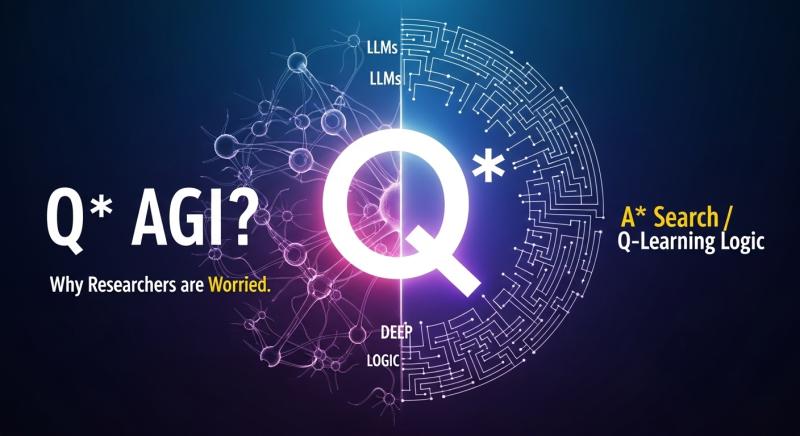
What is Q* and Why are AI Researchers Calling it the Next AGI Breakthrough?
Table of Contents (TOC)
- The Enigma of Project Q* (Q-Star)
- What Makes Q* Different from Current LLMs?
- The Fusion of A-Star Search and Q-Learning
- Why Math Proficiency is the AGI Benchmark
- The Controversy: Safety, Secrecy, and the AGI Race
- The Road Ahead: Q*'s Potential Impact on Science
1. The Enigma of Project Q* (Q-Star)
The AI community was thrown into a whirlwind of speculation in late 2023 with the rumored emergence of Project Q* (pronounced "Q-Star") from OpenAI. While officially unconfirmed, Q* is speculated to be a revolutionary new AI model that represents a major stride toward Artificial General Intelligence (AGI)—the point where an AI can perform any intellectual task a human can. The immense buzz surrounding Q* stems from its reported ability to do something traditional Large Language Models (LLMs) notoriously struggle with: advanced logical reasoning and problem-solving.
2. What Makes Q* Different from Current LLMs?
Current LLMs like GPT-4 are essentially prediction machines; they generate text by calculating the most statistically likely next word based on their training data. They excel at pattern recognition but often fail at tasks requiring genuine, multi-step logical deduction or long-term planning, frequently leading to "hallucinations" or errors in math problems.
Q*, in contrast, is rumored to exhibit a form of systematic, step-by-step reasoning. Instead of merely predicting an output, it appears to calculate and explore different pathways to a solution, a cognitive process akin to how humans reason. This ability to generalize knowledge to solve novel problems outside its training set is what researchers view as a key precursor to AGI.
3. The Fusion of A-Star Search and Q-Learning
The name Q* itself provides a clue to its potential architecture, suggesting a powerful combination of two classical AI algorithms:
- Q-Learning: A core Reinforcement Learning (RL) algorithm. In Q-Learning, an "agent" learns the optimal action to take in any given state to maximize a long-term reward. $Q^*$ (Q-star) traditionally represents the optimal Q-function that guides the agent to the best possible strategy.
- A* (A-Star) Search: A classic pathfinding and graph traversal algorithm used in computer science to efficiently find the optimal path to a goal by evaluating cost and heuristic distance.
The fusion of LLMs with these two algorithms would create an agent capable of long-range planning (A*) while optimizing its decision-making at every step (Q-Learning). This moves the AI from a simple information repeater to an autonomous problem-solver.
4. Why Math Proficiency is the AGI Benchmark
Reports indicate Q* demonstrated the ability to solve grade-school level math problems accurately, even those it had not encountered before. This is a significant milestone because:
- Requires Reasoning: Solving math word problems requires understanding natural language, converting it into symbolic logic, performing multi-step operations, and holding context—all System 2 thinking traits.
- Generalization: When an AI can accurately solve an unfamiliar math problem, it proves it has learned underlying, generalized rules, not just memorized patterns.
5. The Controversy: Safety, Secrecy, and the AGI Race
The development of Q* reportedly ignited internal concerns at OpenAI regarding the speed and safety of the AGI pursuit. The major concern is autonomous self-improvement: an AI that can learn and improve its own core algorithms with limited human intervention. Such capability, while promising transformative scientific breakthroughs, also raises immediate questions about control and potential unintended consequences, highlighting the critical need for robust AI safety protocols as we approach AGI.
6. The Road Ahead: Q*'s Potential Impact on Science
If the capabilities of Q* are confirmed and scaled, the impact will extend far beyond chatbots. 19It could revolutionize areas that rely heavily on complex reasoning and problem-solving:
- Scientific Research: Generating new mathematical proofs, discovering novel drugs, or optimizing chemical reactions.
- Coding: Writing, debugging, and optimizing complex software systems autonomously.
- Finance & Logistics: Building sophisticated, robust planning and optimization agents for global supply chains.
Q* is a beacon in the quest for AGI, signaling a shift from models that simply talk like humans to models that can genuinely think and reason.

